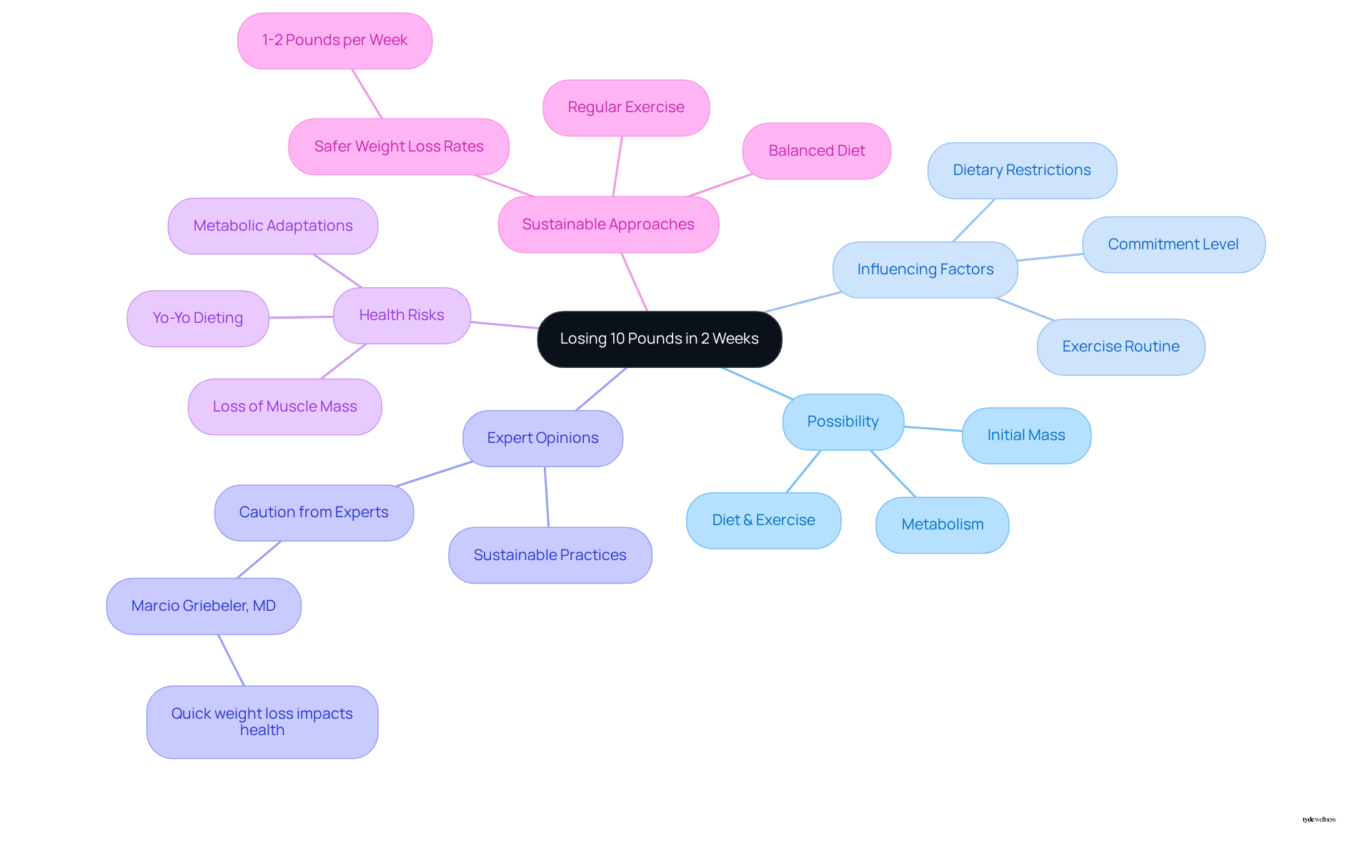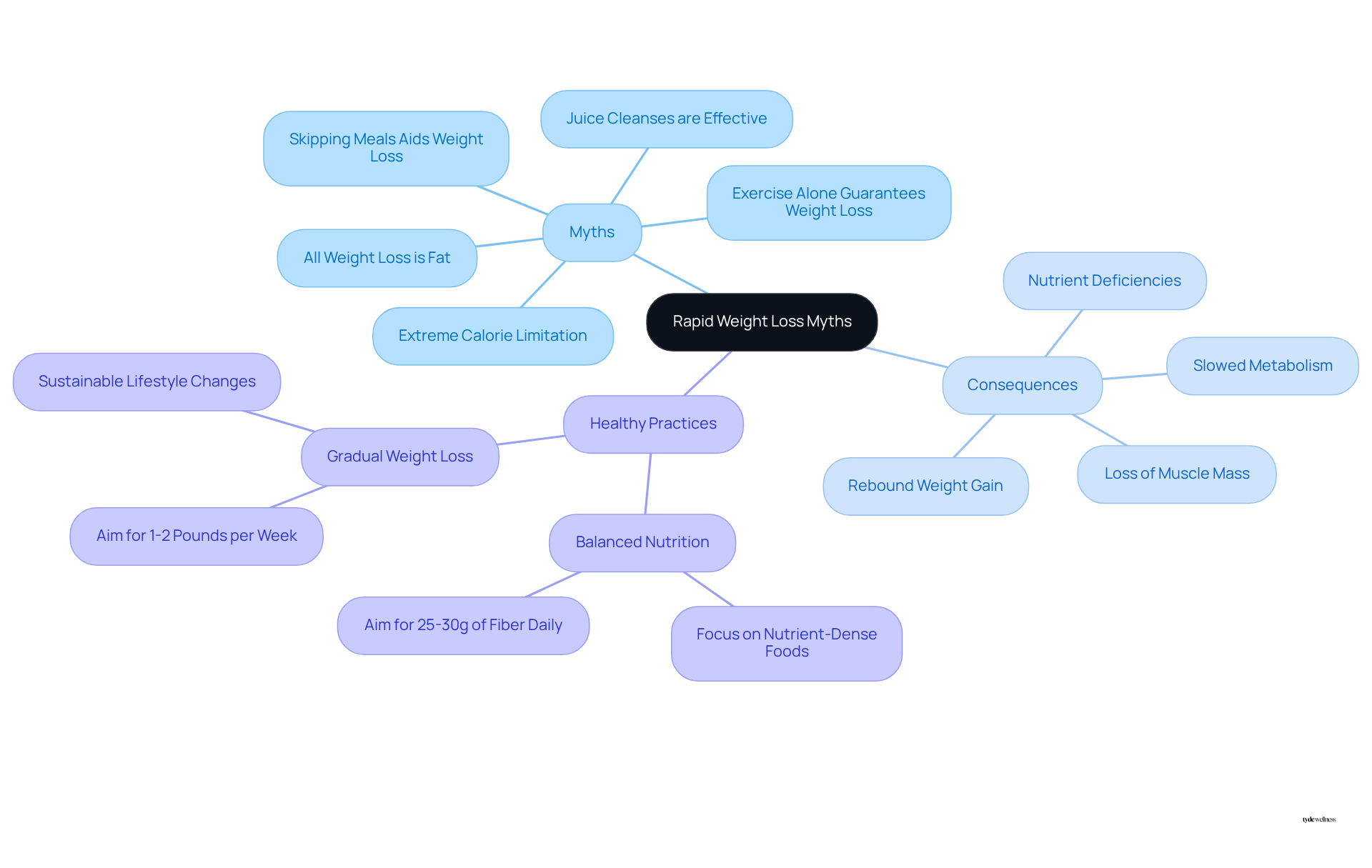Overview
It is technically possible to lose 10 pounds in 2 weeks; however, this approach is not advisable due to associated health risks and unsustainable practices. Rapid weight loss often leads to the loss of water and muscle rather than fat. Experts recommend a more gradual approach, suggesting a safer weight loss rate of 1-2 pounds per week. This method promotes long-term health and helps prevent the cycle of yo-yo dieting.
Introduction
The pursuit of rapid weight loss prompts many individuals to question whether shedding 10 pounds in just two weeks is a realistic goal. While the allure of quick results is enticing, it is crucial to comprehend the complexities involved, such as metabolism, hormonal balance, and lifestyle choices. This article explores the potential consequences of extreme dieting, raising important questions about the sustainability and health risks associated with such drastic measures. Can the desire for swift results overshadow the significance of a balanced and gradual approach to weight management?
Defining the Goal: Is Losing 10 Pounds in 2 Weeks Possible?
A goal that many individuals aspire to is whether they can lose 10 pounds in 2 weeks, particularly those seeking quick results. It is essential to recognize that while the question of can you lose 10 pounds in 2 weeks is technically possible for some, it is not advisable for everyone. Factors such as initial mass, metabolism, and commitment to a strict diet and exercise routine significantly influence the ability to achieve this goal.
Quick weight loss often involves losing water and muscle rather than fat, which can lead to medical issues and is generally not sustainable over time. Experts, including Marcio Griebeler, MD, caution against extreme dieting techniques, stating, “Sure, it’s going to be possible to lose significant mass quickly, but when you understand what that does to your body, you’ll see that it’s probably not a good idea.”
Consequently, while some may reach this objective, it is crucial to approach it with care and prioritize well-being over speed. A practical and secure reduction rate is 1-2 pounds per week, which is safer and more effective for maintaining overall health. Furthermore, rapid weight loss can lead to a cycle of yo-yo dieting, undermining long-term wellness goals.
Focusing on sustainable weight loss not only improves physical health but also enhances blood pressure and cholesterol levels, making it a more advantageous approach for lasting outcomes.

Understanding Weight Loss: Factors That Influence Results
Weight reduction is influenced by various factors, including:
- Metabolic rate
- Hormonal balance
- Dietary choices
- Physical activity levels
- Psychological aspects
For women, hormonal changes during perimenopause and menopause can significantly complicate the management of body mass, making it more challenging to achieve reduction goals. Research indicates that women typically gain about three pounds each year during the menopause transition, accumulating around 22 pounds by menopause. This increase in mass is often accompanied by a rise in abdominal fat, which can escalate from 5-8% to as much as 15% of total body mass, producing harmful hormones like cortisol and inflammatory proteins.
Furthermore, hormonal fluctuations can result in a reduction in metabolic rate, further obstructing efforts to reduce body mass. Research indicates that women using GLP-1 medications, like semaglutide, not only undergo reductions in body mass but also enhancements in cardiovascular metrics, including A1C and blood pressure. This emphasizes the significance of addressing hormonal balance in strategies for reducing body mass.
In addition to hormonal factors, lifestyle aspects such as:
- Stress
- Sleep quality
- General health
play vital roles in managing body mass. Enhanced sleep quality, frequently aided by interventions such as menopausal hormone therapy (MHT), can promote healthier lifestyle selections. However, it is important to note that MHT alone may not directly result in reductions in body mass. Understanding these interconnected factors is crucial for developing a tailored and efficient strategy that aligns with personal situations, especially for women dealing with the challenges of perimenopause and menopause.

Debunking Myths: Facts About Rapid Weight Loss
Numerous myths about rapid mass reduction can mislead individuals into adopting harmful practices. A prevalent misunderstanding is that extreme calorie limitation is the most effective approach for quick body mass reduction. However, this method can lead to nutrient deficiencies and a slowdown in metabolism, making it more challenging to maintain weight loss over time.
Studies indicate that individuals who lose weight rapidly often experience a rebound effect, regaining the lost mass shortly thereafter. In fact, participants in Tyde Wellness programs report an average body mass reduction of 15% after 68 weeks, with many achieving reductions exceeding 20-25% within a year, underscoring the effectiveness of a more gradual approach.
Furthermore, many believe that all weight loss during rapid dieting is fat; in reality, a significant portion may be attributed to water or muscle mass. Understanding these myths is crucial for anyone embarking on a weight loss journey, as it promotes a healthier and more sustainable method of managing one’s physique.
Kelli Wood emphasizes the importance of balanced nutrition, stating that extreme dieting can hinder long-term success. By focusing on balanced nutrition and gradual weight loss, individuals can achieve more effective and lasting results.

Conclusion
Achieving a weight loss goal of 10 pounds in just two weeks is a tempting prospect for many; however, it is essential to approach this aspiration with caution. While it may be feasible for some individuals under strict conditions, the health implications and sustainability of such rapid weight loss are significant concerns. Prioritizing overall well-being and adopting a gradual approach to weight loss is crucial for long-term success.
Key factors influencing weight loss include:
- Metabolic rate
- Hormonal balance
- Dietary choices
- Lifestyle habits
Understanding these elements is vital, especially for women facing challenges such as hormonal fluctuations during menopause. Myths surrounding rapid weight loss often lead individuals to unhealthy practices, including extreme calorie restriction, which can result in nutrient deficiencies and rebound weight gain. Instead, focusing on balanced nutrition and a steady weight loss rate of 1-2 pounds per week proves to be more effective and sustainable.
Ultimately, the journey toward weight loss should emphasize health and well-being over quick fixes. By debunking common myths and recognizing the importance of a tailored approach that considers individual circumstances, individuals can foster healthier habits that lead to lasting results. Embracing a sustainable weight loss strategy not only enhances physical health but also contributes to improved overall wellness, making it a worthwhile endeavor for anyone looking to manage their body mass effectively.
Frequently Asked Questions
Is it possible to lose 10 pounds in 2 weeks?
While it is technically possible for some individuals to lose 10 pounds in 2 weeks, it is not advisable for everyone due to various factors such as initial mass, metabolism, and commitment to a strict diet and exercise routine.
What are the risks of rapid weight loss?
Quick weight loss often involves losing water and muscle rather than fat, which can lead to medical issues and is generally not sustainable over time. Experts caution that extreme dieting techniques can be harmful to the body.
What do experts recommend for safe weight loss?
Experts recommend a practical and secure reduction rate of 1-2 pounds per week, which is safer and more effective for maintaining overall health.
What are the long-term effects of rapid weight loss?
Rapid weight loss can lead to a cycle of yo-yo dieting, undermining long-term wellness goals and potentially affecting physical health negatively.
What are the benefits of sustainable weight loss?
Focusing on sustainable weight loss not only improves physical health but also enhances blood pressure and cholesterol levels, leading to more advantageous long-term outcomes.
List of Sources
- Defining the Goal: Is Losing 10 Pounds in 2 Weeks Possible?
- Is It Safe to Lose 10 Pounds in 1 Week? (https://healthline.com/nutrition/lose-10-pounds-in-one-week)
- Sorry, Quick Weight Loss Just Won’t Cut It (https://health.clevelandclinic.org/can-you-lose-10-pounds-in-a-week)
- 2-Week Workout Plan to Lose 10 Pounds: The Ultimate Workout to Shed a Few Pounds (https://betterme.world/articles/2-week-workout-plan-to-lose-10-pounds)
- Why losing weight too quickly may backfire in the long run (https://nbcnews.com/better/health/why-losing-weight-too-quickly-may-backfire-long-run-ncna841936)
- 11 ways to lose 10 pounds safely (https://medicalnewstoday.com/articles/321493)
- Understanding Weight Loss: Factors That Influence Results
- Why am I gaining weight so fast during menopause? And will hormone therapy help? – UChicago Medicine (https://uchicagomedicine.org/forefront/womens-health-articles/2023/april/menopause-weight-gain-hormone-therapy)
- Can Combining GLP-1s and Hormone Therapy Boost Weight Loss? A New Study Shows Significant Results (https://oprahdaily.com/life/health/a65476576/hormone-therapy-glp-1-menopause-weight-loss-study)
- Combination of obesity medication tirzepatide and menopause hormone therapy fuels weight loss (https://endocrine.org/news-and-advocacy/news-room/endo-annual-meeting/endo-2025-press-releases/castaneda-press-release)
- Weight stigma for women has some doctors feeling wary of new obesity counseling recommendations (https://nbcnews.com/health/health-news/doctors-recommended-give-weight-counseling-women-rcna46502)
- Semaglutide Shows Enhanced Weight Loss in Postmenopausal Women on Hormone Therapy (https://managedhealthcareexecutive.com/view/semaglutide-shows-enhanced-weight-loss-in-postmenopausal-women-on-hormone-therapy)
- Debunking Myths: Facts About Rapid Weight Loss
- Mayo Clinic experts debunk 6 weight loss myths (https://kare11.com/article/news/health/mayo-clinic-experts-debunk-6-weight-loss-myths/89-713c719d-96c8-4ba0-8575-38efa5c320b1)
- Debunking 6 Weight-Loss Myths — Plus, What Really Works (https://aarp.org/health/healthy-living/weight-loss-myths)
- Busting Common Weight Loss Myths (https://tuftsmedicine.org/about-us/news/busting-common-weight-loss-myths)
- 10 Common Myths About Weight Loss Debunked (https://roguecommunityhealth.org/blog/weight-loss-myths)
- 7 Weight Loss Myths Debunked – Feed Your Potential (https://fyp365.com/7-weight-loss-myths-debunked)



